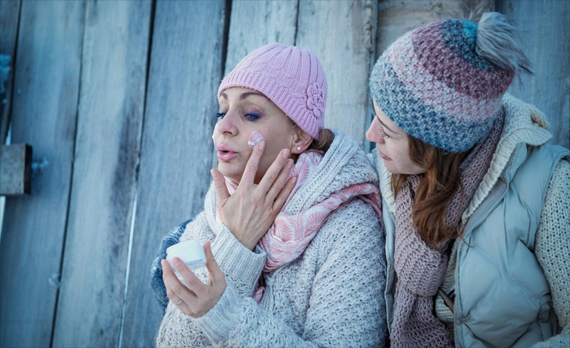How To Take Care Of Your Skin During Winter
Winter comes with some obvious perks like holidays, vacations, cosy sweaters, and an extra excuse to cuddle. But your skin feels otherwise – it gets drier, cracked, and flakier in the year’s colder months. Cold air and harsh winter wind can zap off the natural moisture barrier of your skin and leave it feeling dry and dull. Dealing with cracked, dry winter skin is probably every person’s nightmare but this can also be avoided. Not sure how to take care of your skin in winter? Don’t worry as we’re here to help you with some winter dry skin remedies. Start taking notes because we’re here with some genius tips for dry winter skin so that you can celebrate this holiday season with smooth and soft skin.
But first, let’s understand how to identify you have dry skin.
Symptoms of dry winter skin
Some common symptoms of dry winter skin include:
- Redness
- Rough to touch
- Itchiness
- Cracking
- Burning skin
- Skin feels tight
- Flakiness
- Increased sensitivity
How to take care of your skin in winter?

Here are some tips for dry winter skin to help you flaunt hydrated, smooth, and supple skin throughout the year:
Avoid long, hot showers
Staying in the shower for a long time can disrupt your skin’s barrier and lead to further dryness. It can also strip off the natural oils from the skin and leave it feeling dull and dehydrated. So, limit exposing your skin to hot water during showers, and use lukewarm water to prevent dryness. Additionally, make sure to moisturise your skin immediately after bathing.
Use gentle skincare products
Some cleansers, face washes or scrubs are too harsh for dry, dehydrated, and sensitive skin. A good winter dry skin remedy is to opt for chemical-free, gentle cleansers and soothing skincare products to pamper your skin with the love and care it needs. Avoid using products that contain fragrance, alcohol, or dyes as they may dry out your skin further.
Incorporate hyaluronic acid into your skincare
Hyaluronic acid is an amazing ingredient to keep your skin hydrated and healthy. Therefore, one of the best ways to deal with dry winter skin is to incorporate hyaluronic acid into your winter skincare routine as it helps to retain the natural moisture barrier of the skin while improving its texture and feel. You can do so by including hyaluronic acid serums, creams or even sheet masks into your daily regimen.
Get a humidifier
Getting a humidifier is a great winter dry skin remedy to maintain the moisture content during the colder months of the year. Not only does this prevent the loss of moisture from your skin, but also helps you stay warm and cosy all the time.
Maintain a balanced diet
Your skin health depends a lot on what you consume. Hence, one of the best tips for dry winter skin is to stay away from oily, junk, and fast food, regardless of how much you’re craving that hot, spicy, and cheesy pizza right now. Instead, include protein, vitamins and mineral-rich foods in your regular diet to ensure skin hydration from within. Also, don’t forget to hydrate your body by drinking at least eight glasses of water along with other liquids in your daily diet.
Don’t skip the night cream
Overnight treatments are an excellent way to combat dry winter skin. This will replenish your skin with the moisture and oils it needs during winter. You can use a night cream enriched with anti-ageing elements to hydrate the skin and boost regeneration for a fresh look while reducing fine lines, and wrinkles, boosting skin firmness, youthfulness, and radiance, and enhancing the skin overnight.
Avoid over-exfoliation
Exfoliation is a great way to remove dead skin cells and impurities from the surface of your skin, which keeps it looking smooth and vibrant. However, overdoing it can lead to dry, flaky, itchy, cracked, and irritated skin. Moreover, using harsh scrubs are likely to break down your skin’s moisture barrier and cause further damage. So, see to it that you don’t over-exfoliate and use the right products when you exfoliate dry winter skin.
Alter your skincare routine
It is very important to keep in mind that you need to alter your skincare routine as the season changes. To break this down, summer may demand gel-based moisturisers whereas winters may demand creamy ones, depending on your skin type. Hence, as the weather changes, you need to understand your skin’s needs and make the required alterations right away.
Never scratch or rub your skin
The struggle to not scratch your itchy skin is real. However, this will only cause further damage and inflammation. So, stay away from scratching your skin and use gentle lotions to treat itchy, dry winter skin. Also, use a soft cloth or towel to wipe your skin, and make sure you don’t rub it over your skin.
Keep the above-mentioned winter dry skin remedies in mind and browse through our wide range of L’Oréal Paris skincare products to make your skin feel at its best all the time. You can also head to the L’Oréal Paris Skin Genius tool to analyse your skin like an expert, discover personalised skincare routines validated by the International Board of Dermatologists and grab your hands on the products that work the best for your skin!
1. Invest in a Humidifier to Maximize Moisture
“In the cooler winter months, the outdoor air typically holds onto less water and is drier and colder,” says Naissan O. Wesley, MD, a dermatologist with Skin Care and Laser Physicians of Beverly Hills in California. A humidifier in your home or office will restore moisture to the air, helping to keep your skin hydrated, according to the Cleveland Clinic.
Run a humidifier in your entire home or in rooms you spend the most time in, and aim to keep indoor humidity levels between 30 and 50 percent. One option is to turn it on overnight while you’re sleeping. If you’re unsure of your home’s humidity levels, you can purchase a humidity meter, such as the highly rated Goabroa unit (Amazon.com).
2. Keep Thermostat Temperatures Cool and Comfortable
If you’re looking to escape dry, chilly outdoor air, you may be tempted to crank up the heat as soon as you get home. But high central heat can make the air in your house even drier, notes the American Osteopathic College of Dermatology (AOCD). Try a cool yet comfortable setting to prevent your skin from drying further — the AOCD recommends 68 to 75 degrees F.
3. Lower Water Temperatures for Showering and Hand-Washing
Long, steamy showers may sound like a great idea when it’s cold and blustery, but very hot water can dry out the skin, says Marie Hayag, MD, a dermatologist and the founder of Fifth Avenue Aesthetics in New York City. A 5- to 10-minute warm shower (or bath) is less likely to worsen dry skin than a hot one, suggests the AAD.
A good rule of thumb: If the water causes your skin to turn red, it’s too hot, notes UPMC.
You should also avoid using excessively hot water to wash your hands. This is especially true if your hands tend to be red, scaly, and itchy (potential signs of eczema on the hands, per the National Eczema Association). Dry skin from exposure to hot water or cool winter air can trigger an eczema flare-up.
Cooler water seems to be as effective as warm water at removing germs and is less irritating to the skin, according to the Centers for Disease Control and Prevention (CDC).
4. Opt for Gentle, Fragrance-Free Body Cleansers
When bathing, bar soap can worsen dryness by stripping the skin’s natural oils and disrupting the microbiome, Dr. Wesley says.
“For those with dry skin, I recommend using body wash,” Dr. Hayag says. “Look for washes that are labeled ‘for sensitive skin’ or ‘dye free’ and ‘fragrance-free.’ Oftentimes they contain fewer drying ingredients and more moisturizing ones like hyaluronic acid, ceramides, oils, shea butter, and oats.”
Also, look for products labeled “fragrance-free,” advises the AAD. “Unscented” products may actually contain chemicals that neutralize scent and can cause irritation.
5. Modify Your Skin-Care Regimen for the Season
If your skin is dry and itchy, Hayag recommends you scale back on the use of skin-care products containing alpha-hydroxy acids (AHAs) and retinoids on the face, as these can cause the issue to worsen and may even be a sign of an irritant dermatitis (a skin reaction that occurs after prolonged exposure to an irritating substance). “Once the skin is healed, you can restart the retinoid and alpha-hydroxy acids slowly,” she says.
In addition to skipping AHAs and retinoids when the skin on your face is dry, the AAD recommends steering clear of products that contain alcohol and fragrances, as this will help skin retain its natural oils.
Instead, choose oils and creams for your skin-care routine, and consider applying a moisturizer on top of your toner if the latter is causing dryness, Wesley says.
At night, use a richer moisturizer on your body, including your arms, legs, and midsection. “Look for occlusives, such as petrolatum, squalene, and shea butter,” Hayag says. “These are ingredients that seal in moisture by forming a protective seal over the skin.” Hayag also recommends seeking out a product with moisturizing humectants, such as hyaluronic acid and glycerin. These are great ingredients for the face, as they allow the skin to breathe and are unlikely to contribute to acne.
And don’t forget to moisturize the rest of your body, either. “For the body during the winter, I recommend using a thicker cream that comes out of a jar or tube as opposed to a pump,” Wesley says. “Lotions that come out of a pump tend to be thinner and more watery, so they can often just evaporate from the skin’s surface after application and are not thick and moisturizing enough.”
As for your lips, a moisturizing balm (such as petroleum jelly or another ointment) can help heal dry, cracked lips and keep them from getting chapped, according to the AAD.
6. Moisturize Hands Frequently, Especially After Washing
Hand-washing, as the CDC notes, is vital, especially when the common cold, flu, and COVID-19 are a threat. But “constant washing will cause the hands to take a beating,” says Linda Stein Gold, MD, a board-certified dermatologist at Henry Ford Medical Center in West Bloomfield, Michigan.
Apply hand cream after each washing, Dr. Stein Gold adds. She also recommends wearing waterproof gloves to protect your hands while you’re washing dishes or cleaning around the house.
You can put on cotton gloves after applying moisturizer to help your skin absorb the cream, says Wesley.
7. Apply Sunscreen — Even on Gray Winter Days
On bright winter days, snow reflects the sun’s rays, which in turn multiplies your UV exposure, according to the Skin Cancer Foundation. UV rays have been linked to skin cancer, sunburn, and premature skin aging (such as wrinkles, leathery skin, and liver spots), per the American Cancer Society.
That means whether you’re out on the slopes, playing in the snow, or walking through a parking lot on an errand run, it’s just as important to apply sunscreen in the harsh winter weather as it is in the summer.
Don’t be fooled by darker, dreary days in winter, either. Up to 80 percent of the sun’s harmful UV rays can permeate clouds and still cause damage, according to the Skin Cancer Foundation.
Before you go outside, apply a broad-spectrum sunscreen with an SPF of 30 or higher with water resistance and moisturizing ingredients such as lanolin or glycerin to all exposed areas of your body, says the Skin Cancer Foundation.
8. Wear Appropriate, Comfortable, Nonirritating Clothing
Many cold-weather fabrics can aggravate dry winter skin. “Keep wool and rough clothing from directly touching your skin,” Stein Gold says. “This can cause dry skin to get irritated and itchy.”
Instead, wear light layers made from soft, breathable materials (like cotton or silk) directly against your skin. After that, pull on your heavier, warmer sweaters, recommends the AAD.
Be sure to protect your hands from cold winter air with gloves or mittens. If wool gloves are too irritating, try leather ones, Wesley suggests.
9. Remember to Eat Right and Stay Hydrated
Don’t expect drastic results, but it may be possible to moisturize your skin slightly from the inside out. “Staying hydrated by drinking plenty of fluids, like water, is one of the best things you can do via diet to avoid dryness,” Wesley says. One small study found that people with low water intake were able to positively impact their skin hydration by drinking more water (in this case, two liters of water more than their usual daily intake).
Your diet may play a role as well. “Avoiding processed foods and sugars, and eating whole foods that are rich in essential vitamins, minerals, and fatty acids will keep the body and skin healthy,” Wesley says.
10. Pat Yourself Dry, Then Lock in Moisture
Pat your hands dry after washing them, Hayag says. The AOCD says that blotting or patting the skin dry rather than rubbing it helps retain more moisture.
Do the same when toweling off after a shower, advises Stein Gold: “Blot skin dry and apply a thick moisturizer within a few minutes after bathing to seal the water into the skin.”
A Final Word on Healthy Winter Skin
If you still experience dryness, discomfort, redness, and irritation after trying these healthy skin tips, Stein Gold suggests using an over-the-counter 1 percent hydrocortisone cream. “If you don’t see improvement in a few days, talk with your doctor,” Stein Gold says. You may need a prescription-strength moisturizer to overcome winter’s drying effects on your skin, or your dry skin may be a sign of a skin condition that needs to be addressed, according to the AAD.


